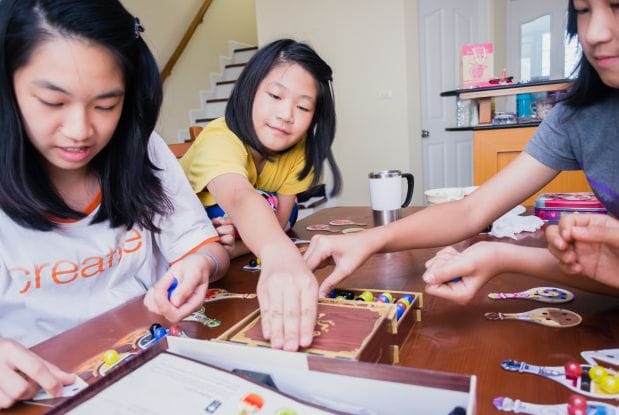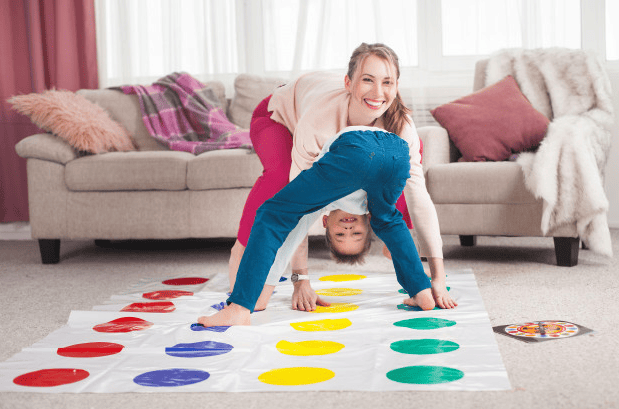
Every year around the holidays, we are asked for recommendations of activities that allow kids to practice the skills they learn in OT at home. One activity that often gets overlooked is board games. When chatting with my kiddos, they often tell me all about their mobile games and video games. When I ask what games they plan to play this summer, they continue to tell me about the same mobile and video games. When I ask about any board games they have at home, they tell me about this one specific time they played this fun game with their family, their sibling, or got one on one time with their parent. They tell me who won, where they played, and are able to elaborate on this great memory.
During COVID-19 self-quarantine, my family and I dusted off the board game closet and started playing our games from the ’80-90’s. We had such a fun time looking back on all the old games we played when I was younger, reading the little notes my sister would write when my dad would beat us at Yahtzee (naturally he kept all of the scorecards from when he won). We reflected on the times my mom, brother, and I played Scrabble when my brother was home from college for the summer and saw the names of old friends written on score cards from when we played Clue in my basement in the 2nd grade. It brought back all of these childhood memories. With mobile games, apps, video games, we don’t get the same opportunity to look back on past games, who we played them with, or any of the memories that go along with them. Each game rolls right into the next, most games are one player, and only your top scores are saved.
Not only are board games a great way to bond with family, have fun with friends, but they allow your kids to work on a variety of skills such as social skills, problem solving, fine motor skills, visual motor skills, executive functioning skills, the list goes on.
Below is a list of board games that work on a variety of skills that also allow for kids to start making their own memories!
Cranium Conga
- Recommended age: 8+
- Number of players: 3-6 player
- Play time: 30 minutes
This game works on problem solving skills where the group guesses your answers to questions. It also allows you to practice your handwriting when writing on the magnetic pad, fine motor skills and hand strength when sculpting with clay, or motor planning when you have to “act out” your answer.
Guess Who
- Recommended age: 6+
- Number of players: 2-3 players
- Play time: 30 minutes
Guess Who works on visual scanning, social skills, language, processing and attention skills by asking questions to one another to guess who the person is on the other player’s cards. By narrowing down your options each turn, you work on finger isolation and grading force as you push the characters down who do not match the other players description.

Twister
- Recommended age: 6+
- Number of players: 2+ players
Twister is a great activity that incorporates the whole body! It involves motor planning, crossing midline, strength, body awareness, learning left vs right, as well as social skills when on the twister board with another player. One player spins the spinner and tells the players where they need to place their hand or foot.
Avalanche Fruit Stand
- Recommended age: 3+
- Number of players: 1-4 players
This game utilizes our fine motor skills. Using the tweezers allows players to work on hand strengthening and separation of two sides of the hand which is important for scissor use and handwriting utensil grasps. This game also works on identifying fruits and colors, simple counting skills, and taking turns.
Jenga
- Recommended age: 6+
- Number of players: 2 players, single player
- Play time: 30 minutes
Jenga is a great game that is easily adaptable to include additional skills. For example, you can write questions on each piece (i.e. what is your favorite outdoor activity? What is something you want to do before this year is over?) to work on social skills, processing, and critical thinking. You can also adapt it into a gross motor movement game (touch your toes 10 times, bear walk, do 5 jumping jacks) to work on gross motor skills such as balance, coordination, motor planning, hand-eye coordination. Just want to play Jenga without adding additional aspects? Great! You are still working on fine motor precision, isolating the index finger, as well as motor planning each time you plan and make your move.
Uno
- Recommended age: 7+
- Number of players: 2-10
Uno is a fun card game that includes shuffling, holding, fanning, and dealing out multiple cards. These tasks work on fine motor skills such as manual dexterity, in-hand manipulation, and coordination of both hands when dealing the cards. This game also works on number and color recognition, processing skills, strategy, and a variety of other executive functioning skills.
There are so many other board games out there that work on the skills listed above, and everyone has their favorites. If you are looking for good gifts for your child and have hit a roadblock, ask your child’s therapist if they have recommendations. I bet they know your child’s favorites in the clinic and some new ones to help build skills! Another fun activity is having kids make their own board game. Grab some cardboard and markers and create your family’s new favorite game!
occupationaltherapy #occupationaltherapist #ot #boardgames #kidgiftideas #occupationaltherapyassistant #finemotorskills #visualmotorskills #pediatrictherapy #gamerecommendations #motorplanning #visualscanning #grossmotorskills #otgames #kids #familytime #socialskills
